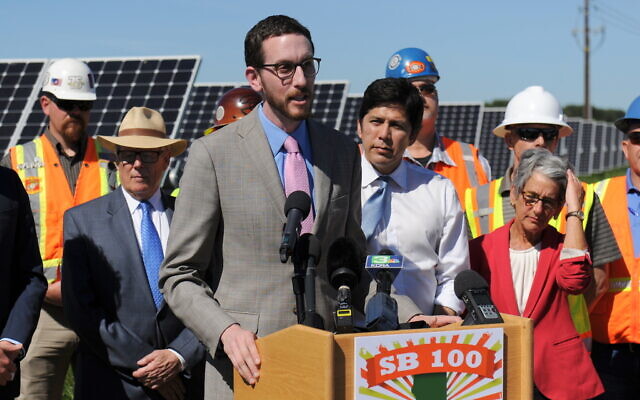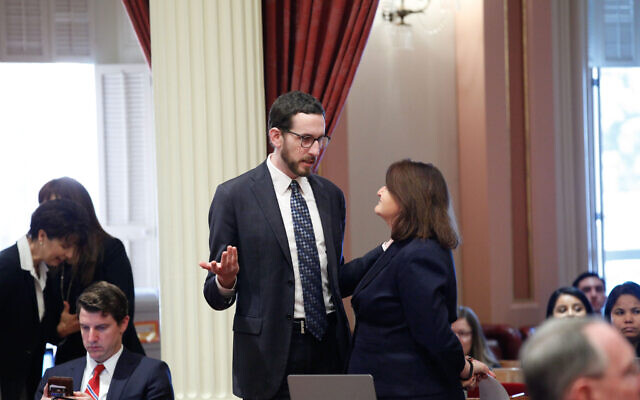Unsettled by Jewish history, a California lawmaker takes on his state’s housing woes
Co-chair of Sacramento’s Jewish Caucus, State Senator Scott Wiener cites his upbringing as inspiring legislation that will allow religious institutions to build homes on their land
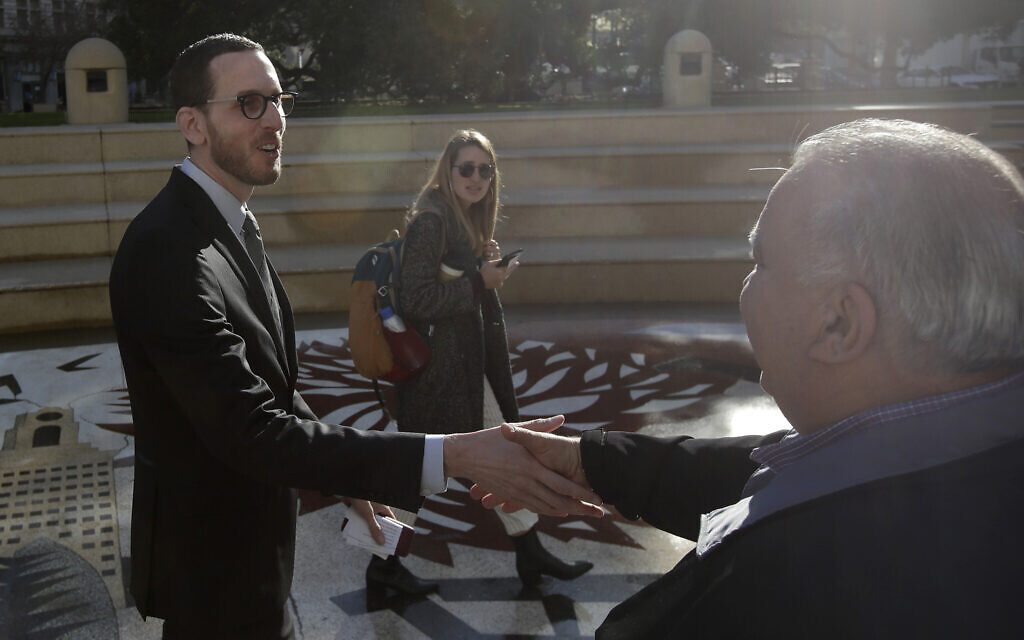 California Sen. Scott Wiener, left, shakes hands with a man after a rally for more housing outside of City Hall in Oakland, California, January 7, 2020. (AP Photo/Jeff Chiu, File)
California Sen. Scott Wiener, left, shakes hands with a man after a rally for more housing outside of City Hall in Oakland, California, January 7, 2020. (AP Photo/Jeff Chiu, File)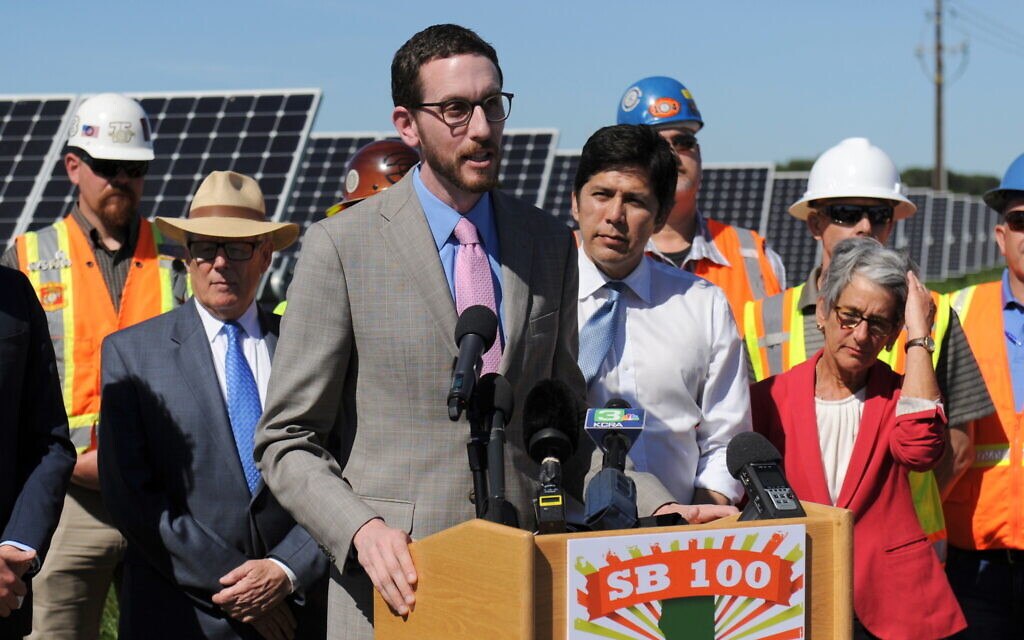 California State Senator Scott Wiener speaks about bill SB100 in an undated photo. (Courtesy)
California State Senator Scott Wiener speaks about bill SB100 in an undated photo. (Courtesy)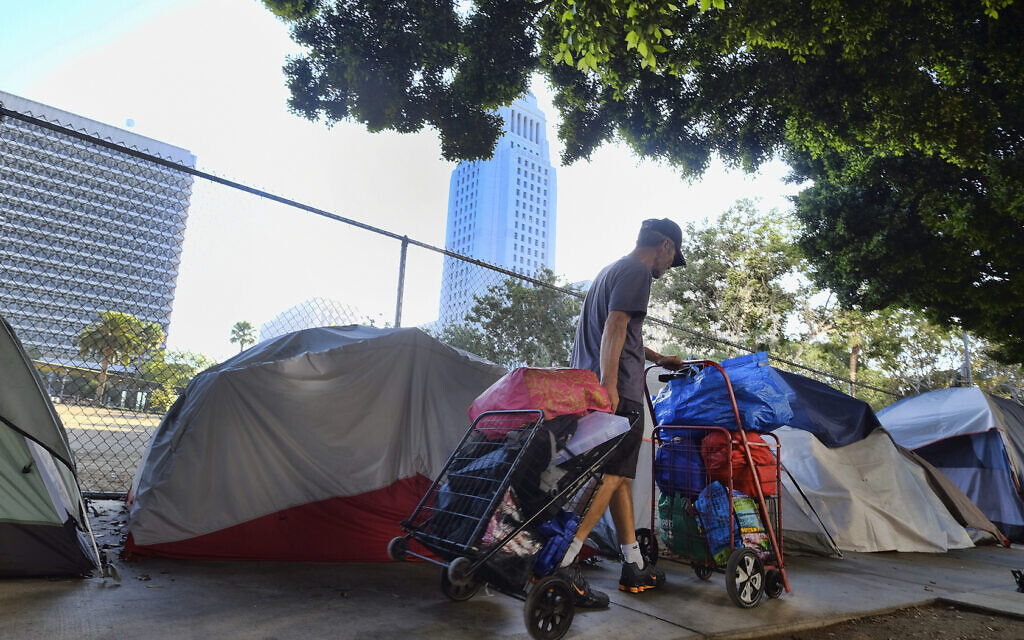 A homeless man moves his belongings from a street behind Los Angeles City Hall as crews prepared to clean the area on July 1, 2019. (AP Photo/Richard Vogel, File)
A homeless man moves his belongings from a street behind Los Angeles City Hall as crews prepared to clean the area on July 1, 2019. (AP Photo/Richard Vogel, File)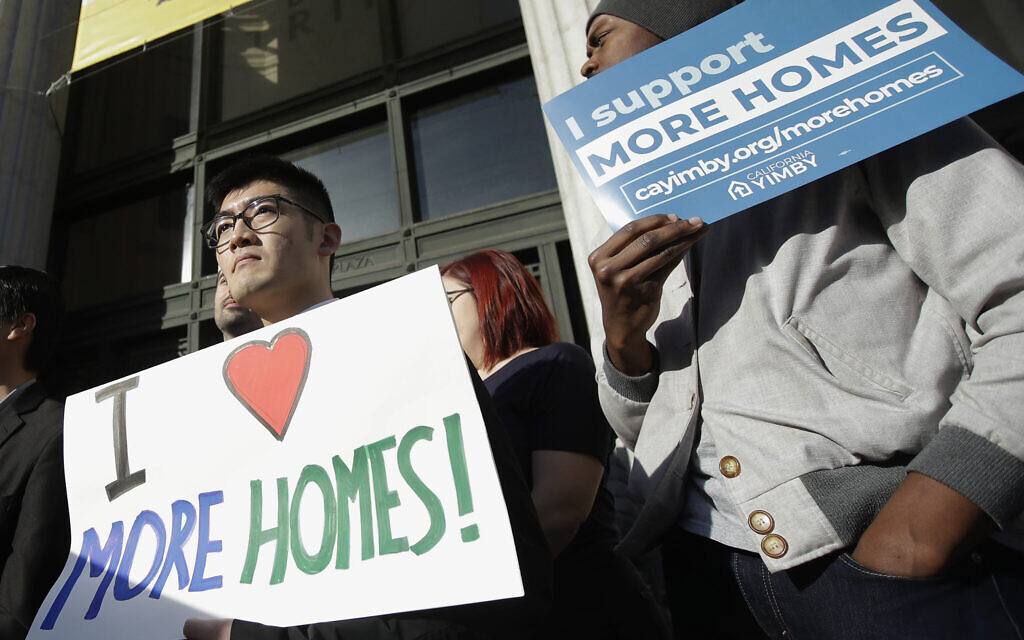 Men hold up signs at a rally outside of City Hall in Oakland, California, in support of more housing on January 7, 2020. (AP Photo/Jeff Chiu, File)
Men hold up signs at a rally outside of City Hall in Oakland, California, in support of more housing on January 7, 2020. (AP Photo/Jeff Chiu, File)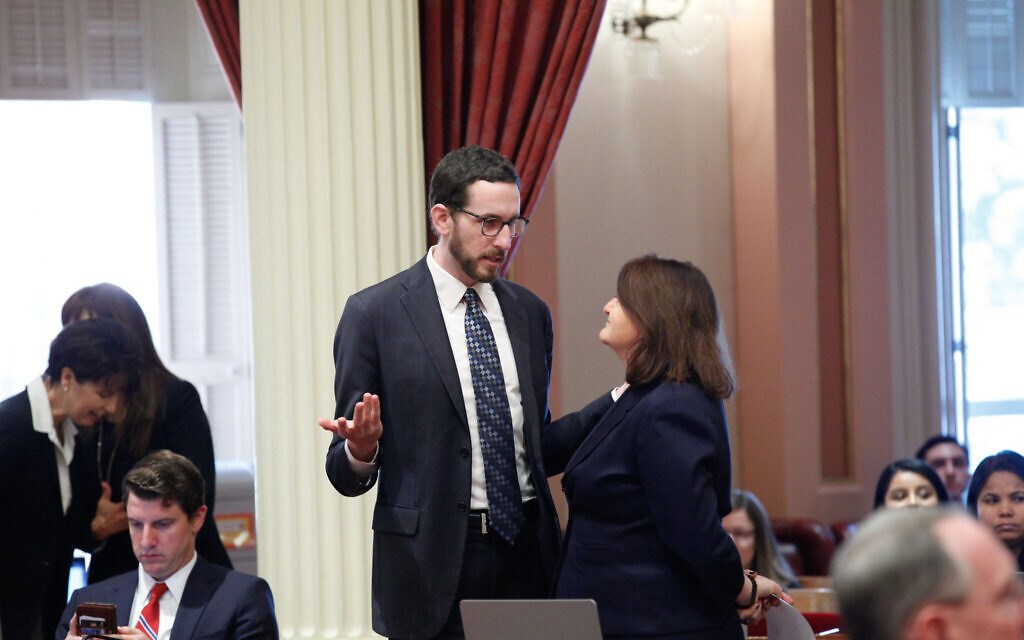 California State Senator Scott Wiener in an undated photo. (Courtesy)
California State Senator Scott Wiener in an undated photo. (Courtesy)
LOS ANGELES — California State Senator Scott Wiener paused to munch on blueberries as he pitched his affordable housing bill earlier this year to members of IKAR, a Jewish congregation based in LA.
The bill, which recently gained ground as it advances toward ahead of a final vote on the Senate floor, touches on an issue that’s close to Wiener’s heart and closely tied in with his Jewish identity — which he made sure to mention in the Zoom meeting.
“I learned very early on that, for Jews, if the wrong government comes into power, really bad things can happen,” Wiener told the attendees. “I view politics and lawmaking as saving lives and we know that the housing crisis is killing people.”
The bill, known as SB4, would allow religious institutions such as synagogues and churches to build 100 percent affordable housing on their land without heeding local zoning or parking restrictions. It is another effort to solve California’s massive housing crisis: More than half of renters in the state put in excess of 30% of their income — the widely recommended limit — toward housing costs.
Many policy experts attribute this lack of affordability to a statewide housing shortage, which Beacon Economics, a research and consulting firm, estimates at 2.3 million homes.
The crisis is affecting broad and diverse parts of California’s population. Young urban tech workers left the state during the coronavirus pandemic, put off by the difficulty of buying a home for their budding families. California’s homeless community is the largest in the US. And low and middle-income workers in California have been driven out of major economic hubs, either enduring multi-hour commutes or opting for lower-paying employment elsewhere.
Many of Wiener’s past housing bills have sought to bring more housing production online and alleviate this shortage. However, this is the first one that he tied explicitly to his Jewish background.
“If you look at the history of the Jews, we’ve at times been told where we have to live, segregated away from other members of the community, even put into ghettos,” Wiener told The Times of Israel.
“There’s a certain xenophobia, in the broad sense. A reaction against new people moving in, people who might be a little different… And we see that as a recurring theme in some of these housing fights. And so I think it’s really important to have integrated, welcoming, diverse communities. It makes us stronger, and that aligns very well with Jewish values.”
Helping solve this problem “really springs in a significant part from my Judaism,” he said.
Growing up under the shadow of antisemitism
In 1971, when Wiener was a year old, his family moved to Washington Township, New Jersey. In the former farming town, antisemitism was rife.
“When we met some of our neighbors a few doors down, they asked my parents why they didn’t have horns,” Wiener said. “I got called a kike, repeatedly.”
Despite this, Wiener’s family stayed. They founded the town’s first synagogue, Bnai Tikvah. At first, they held services in a church and could only afford to bring in an out-of-town rabbi to lead prayers. But eventually, the community swelled to 150 families and erected a building of its own. It continues to this day.
His mother served on the synagogue’s board, Wiener had his bar mitzvah at the synagogue and, for much of his childhood, his only friends outside of school were from the Jewish community.

But his life as Jew wasn’t without challenges. Soon, Wiener was again facing antisemitism.
“When I was in sixth grade, our social studies textbook, which is about Greek and Roman history, had a whole section about how the Jews had begged the Romans to kill Jesus… Eventually, the book was ‘pulled.’ But two years later, my sister got the same book for her class,” he said.
Some of his first political activity revolved around difficulties faced by the Jews in the small town.
“My junior year, at the high school graduation, there was a Christian invocation. And my parents complained,” said Wiener.
“The school formed a committee to take a look at this issue of religion in school. I was on that committee representing students and it became very vile. I got called a communist and Christ-hater,” he said.
At the same time that he faced pushback on his Jewish identity, Wiener was also undergoing another struggle. By this time he knew he was gay, though he hadn’t come out yet. So he found himself hiding one part of his identity and being hated for another.
Fresh start in San Francisco
Wiener’s political career began far away from his New Jersey beginnings. After Harvard Law School, he moved to San Francisco to practice law. It was there that he ran for his first political office, winning the race for supervisor in the 8th district. As a San Francisco city supervisor, he pushed legislation to expand housing access, and increased public transportation funding as well as efforts to reduce HIV infections in the city.
But his political life kicked into high gear when he narrowly won the 11th district State Senate seat.
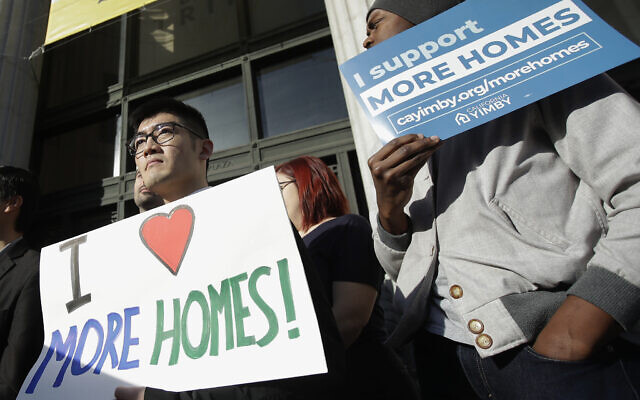
Since then, Wiener has co-sponsored bills to expand renewable energy use, strengthen protections against discriminatory legislation affecting LGBTQ Californians, and solidify aid for Ukrainian and Afghan refugees. Many of these policies were guided by his Jewish point of view.
“My faith definitely informs a lot of my work around trying to lift up communities that are struggling and people who are marginalized,” said Wiener.
Wiener serves as the co-chair of the Jewish caucus. He and others on the caucus have endorsed a number of pieces of legislation, creating a collection of bills they’ve named the “Tikkun Olam Agenda.”
But Wiener is most identified with housing legislation. Since he became a state senator, Wiener has co-sponsored several housing bills, ranging from efforts to further develop housing in single-family zones, legislation to up-zone land in heavy transit areas, and laws that hold local housing authorities responsible for not building enough housing.
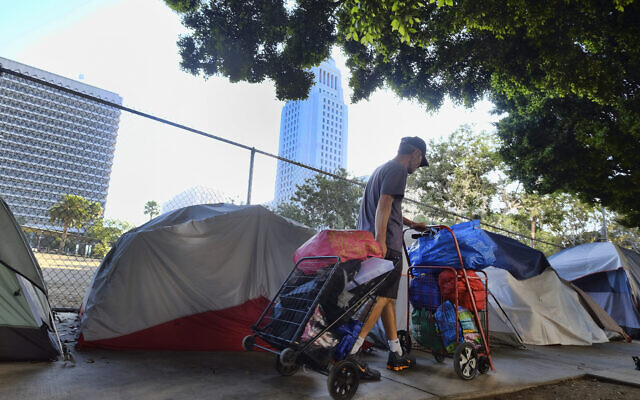
All of this housing legislation has faced significant backlash. Many organizations and political advocates contend that Wiener’s legislation forces density in the state and destroys neighborhoods’ and cities’ unique characters.
These strident warnings have grown darker in the past months. Major cities and counties in California are facing what’s known as a builder’s remedy — if their housing plan is not in compliance with standards set by the state for housing production, their local zoning is canceled. Cities such as Beverly Hills, Santa Monica, Huntington Beach and Berkeley are at risk for this.
And the opposition to Wiener’s advocacy doesn’t only come from the right. Some left-wing activists believe that his solutions rely too much on the free market.
Wiener seems unfazed by the criticism.
“There’s a lot of drama around this,” said Wiener. “Housing never happens as fast as we want. It’s all gradual change. The idea that cities are going to be revolutionized… it’s just ridiculous.”
There's no paywall on The Times of Israel, but the journalism we do is costly. As an independent news organization, we are in no way influenced by political or business interests. We rely on readers like you to support our fact-based coverage of Israel and the Jewish world. If you appreciate the integrity of this type of journalism, please join the ToI Community.

We’re really pleased that you’ve read X Times of Israel articles in the past month.
That’s why we started the Times of Israel eleven years ago - to provide discerning readers like you with must-read coverage of Israel and the Jewish world.
So now we have a request. Unlike other news outlets, we haven’t put up a paywall. But as the journalism we do is costly, we invite readers for whom The Times of Israel has become important to help support our work by joining The Times of Israel Community.
For as little as $6 a month you can help support our quality journalism while enjoying The Times of Israel AD-FREE, as well as accessing exclusive content available only to Times of Israel Community members.
Thank you,
David Horovitz, Founding Editor of The Times of Israel

